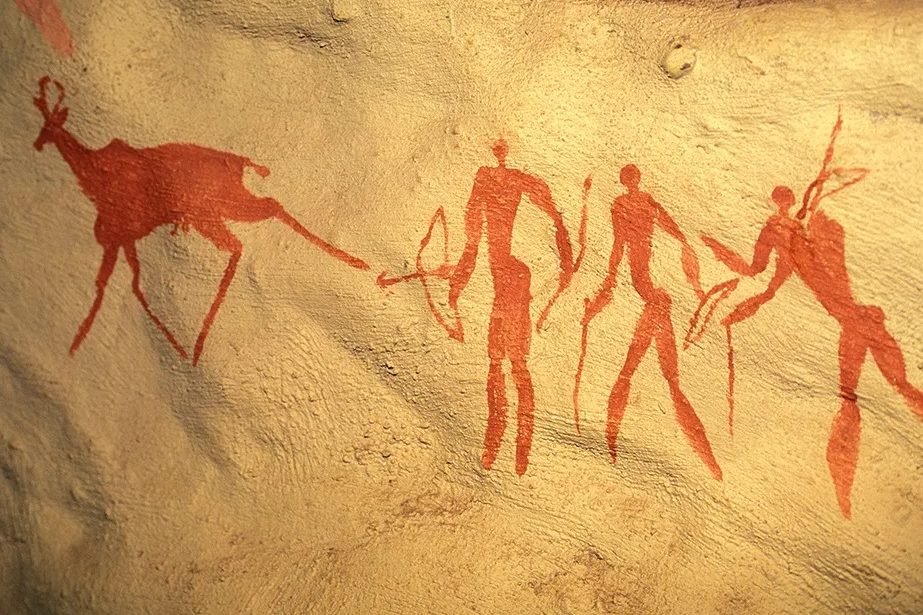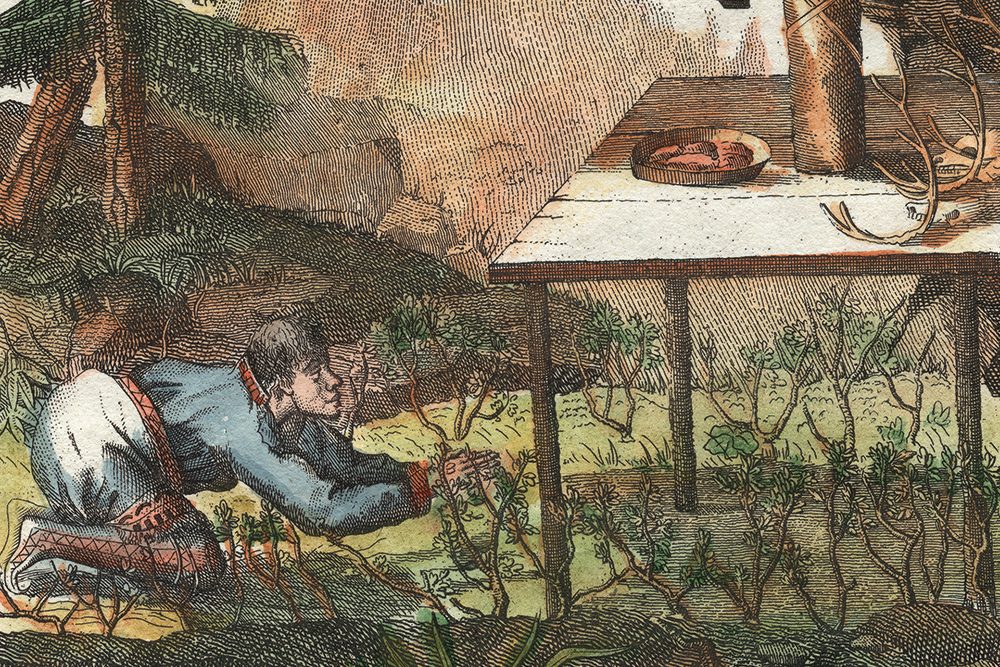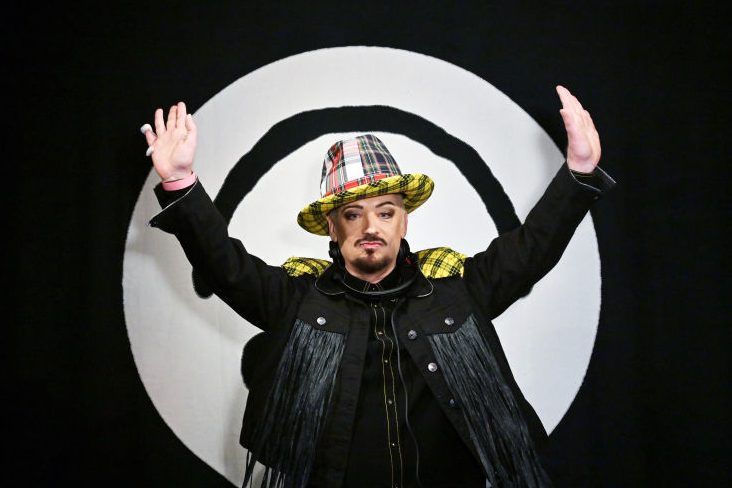Origin stories have always helped humans gain a moral compass. Locked in a tight embrace, the Maori deities Rangi and Papa are separated by their enveloped children, creating the distant father sky and nurturing Mother Earth, bringing light to the world. Mayan gods fashion man from maize after destroying earlier clay and wood versions, who are seen to have no soul. Adam and Eve eat from the Tree of Life but illicitly also from the Tree of Knowledge. One of the more touted modern human origin stories, ostensibly based on evolutionary science, speaks of a natural inequality between violent and promiscuous men and caring and faithful women. Having evolved to produce more of their sort, aggressive, lustful males hunted for game and exchanged meat for sex with coy female partners. The history of civilization, we’re told, is a progressive attempt to replace oppression with deliberative politics, strong men with women’s lib and LGBTQ rights.
Once men grabbed power, they began sitting at the heads of rectangular tables, rather than equitably around circles
But what if the great challenges of humankind do not stem from an inescapable evolutionary need of men to possess women sexually, but rather from a different source: one which we brought upon ourselves as we began to accumulate material wealth beyond our immediate needs? What if equality among the sexes is not a liberal struggle but an evolutionary legacy? Thinkers from Friedrich Engels to Margaret Mead have made this point, speaking of the agricultural revolution as a turning point. Early hunter-gatherers lived in cooperative groups, happy and egalitarian, until they began domesticating plants and animals. It was then that bullies corralled the food surplus and took hold of the means of production. Today we just call them elites.
In Why Men? the anthropologist Nancy Lindisfarne and her historian husband Jonathan Neale use an explicitly “ecological-socialist-feminist” approach to compare humans to our gibbon, gorilla, baboon, chimpanzee and bonobo kin. Arguing that the drivers of social change are material, they conclude that, having left forests for open savannas, our mother and father ancestors had no choice but to cooperate. While men became specialist ambush hunters, their success was unreliable. Half of the caloric intake of the group was therefore provided by roots, tubers, seeds, fish and nuts procured by females. Alongside the demands of reproduction and diet, love now became a material force shaping us. Humans may have descended from primate societies with dominance hierarchies, but sharing food, childcare and orgasms, they gradually put in place the biological and normative architecture that rendered the sexes equal.
This was our predicament for at least 200,000 years, unique in the primate landscape. But wherever surplus was amassed — be it river salmon on the great American plains or pigs in highland Papua or grain in the Fertile Crescent — social class was born. And due mainly to a reduced but persistent physical dimorphism, with class came the dominance of men. Patriarchy and sexism go hand in hand, the authors claim, and there has always been a vested interest in policing gender roles, just like elite privilege, using force and ideology. In reality, neither class nor gender inequality are based on intrinsic value. Humans are more similar to each other than different, as are the two sexes. Not that our species has no nature of its own. Contra to what scientifically naive liberals think (that there is no human nature) and many overconfident evolutionary psychologists argue (that human nature is selfish and violent), evolution granted humans a simultaneous disposition for both equality and inequality. Rather than a steady climb upward, the history of civilization is therefore a rocky rollercoaster of peoples both submitting to and resisting power.
The evidence Lindisfarne and Neale present is eye-opening and eclectic. It includes chemical microanalyses of teeth enamel to show how calorie intake became gendered once men grabbed power and, as archaeologists have shown, began sitting at the heads of rectangular tables in rectangular rooms, rather than equitably around circles. It includes ethnographies of peoples such as the Kung hunter-gatherers of the Kalahari, who cool the hearts of men who boast of their kill by saying: “You mean you have dragged us all the way out here to make us cart home your piles of bones?” Comparisons of penis size of primates abound (humans place above baboons, gorillas and chimps, but alas below bonobos), as well as more surprising sources, such as the trial of Joan of Arc and the torture of inmates at Abu Ghraib.
Perhaps most striking for the claim that the prevention of bullying fitted with a life of hunting and gathering has been the dearth of evidence for violent deaths before the agricultural revolution 12,000 years ago, and the fact that infanticide began to be controlled by females rather than males. This last development allowed early humans to expand the ambit of care for young to fathers, siblings and grandparents, rendering females more fecund than other primates, while putting a premium on shared emotional lives, as well as the wisdom that comes with age.
Why Men? is conceived as a tonic against popular grand histories of humanity by Steven Pinker, Jared Diamond and Yuval Noah Harari, whose naturalizing of inequality the authors chastise, together with their purportedly related neoliberal politics, and David Graeber and David Wengrow’s recent book The Dawn of Everything, whose anarchism they sympathize with but whose lack of ecological-socialist-feminist perspective they disapprove. The question to ask, they argue, is not why we are dominated by authority, but how human society came to be grossly unequal. To venture an answer, one needs to recognize our species’ two most defining shifts: first, adapting to the savannas by becoming equal; and second, adapting to agriculture by inventing class society. Only then can we think more clearly about the shift that lies ahead: how adapting to the ecological changes brought about by global warming will impact the way we eat, work, have sex, care for children and think about gender roles in society.
Will we ever know whether there was an original form of human society, a time before there was inequality between the sexes? I’m not sure. The mysteries of our evolutionary past are compounded by our tendency to confuse is and ought, culture and biology, and to place our moral eggs in the basket of origin stories. As Lindisfarne and Neale themselves acknowledge, human sciences are never clean of politics. To better judge the claims of the interlocutors in this age-old dispute, it’s crucial to consider the available evidence, but also the hopes and fears of those presenting us with the “facts.” I’d like to believe this refreshing book’s premise, but everyone has their own Arcadia. And as Marcel Proust wrote: “The only paradise is paradise lost.”
This article was originally published in The Spectator’s UK magazine. Subscribe to the World edition here.


























Leave a Reply